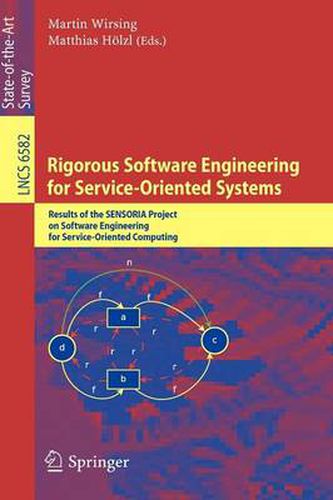Readings Newsletter
Become a Readings Member to make your shopping experience even easier.
Sign in or sign up for free!
You’re not far away from qualifying for FREE standard shipping within Australia
You’ve qualified for FREE standard shipping within Australia
The cart is loading…






This title is printed to order. This book may have been self-published. If so, we cannot guarantee the quality of the content. In the main most books will have gone through the editing process however some may not. We therefore suggest that you be aware of this before ordering this book. If in doubt check either the author or publisher’s details as we are unable to accept any returns unless they are faulty. Please contact us if you have any questions.
Service-Oriented Computing is a paradigm for developing and providing software that can address many IT challenges, ranging from integrating legacy systems to building new, massively distributed, interoperable, evaluable systems and applications. The widespread use of SOC demonstrates the practical benefits of this approach. Furthermore it raises the standard for reliability, security, and performance for IT providers, system integrators, and software developers. This book documents the main results of Sensoria, an Integrated Project funded by the European Commission in the period 2005-2010. The book presents, as Sensoria’s essence, a novel, coherent, and comprehensive approach to the design, formal analysis, automated deployment, and reengineering of service-oriented applications. Following a motivating introduction, the 32 chapters are organized in the following topical parts: modeling in service-oriented architectures; calculi for service-oriented computing; negotiation, planning, and reconfiguration; qualitative analysis techniques for SOC; quantitative analysis techniques for SOC; model-driven development and reverse engineering for service-oriented systems; and case studies and patterns.
$9.00 standard shipping within Australia
FREE standard shipping within Australia for orders over $100.00
Express & International shipping calculated at checkout
This title is printed to order. This book may have been self-published. If so, we cannot guarantee the quality of the content. In the main most books will have gone through the editing process however some may not. We therefore suggest that you be aware of this before ordering this book. If in doubt check either the author or publisher’s details as we are unable to accept any returns unless they are faulty. Please contact us if you have any questions.
Service-Oriented Computing is a paradigm for developing and providing software that can address many IT challenges, ranging from integrating legacy systems to building new, massively distributed, interoperable, evaluable systems and applications. The widespread use of SOC demonstrates the practical benefits of this approach. Furthermore it raises the standard for reliability, security, and performance for IT providers, system integrators, and software developers. This book documents the main results of Sensoria, an Integrated Project funded by the European Commission in the period 2005-2010. The book presents, as Sensoria’s essence, a novel, coherent, and comprehensive approach to the design, formal analysis, automated deployment, and reengineering of service-oriented applications. Following a motivating introduction, the 32 chapters are organized in the following topical parts: modeling in service-oriented architectures; calculi for service-oriented computing; negotiation, planning, and reconfiguration; qualitative analysis techniques for SOC; quantitative analysis techniques for SOC; model-driven development and reverse engineering for service-oriented systems; and case studies and patterns.